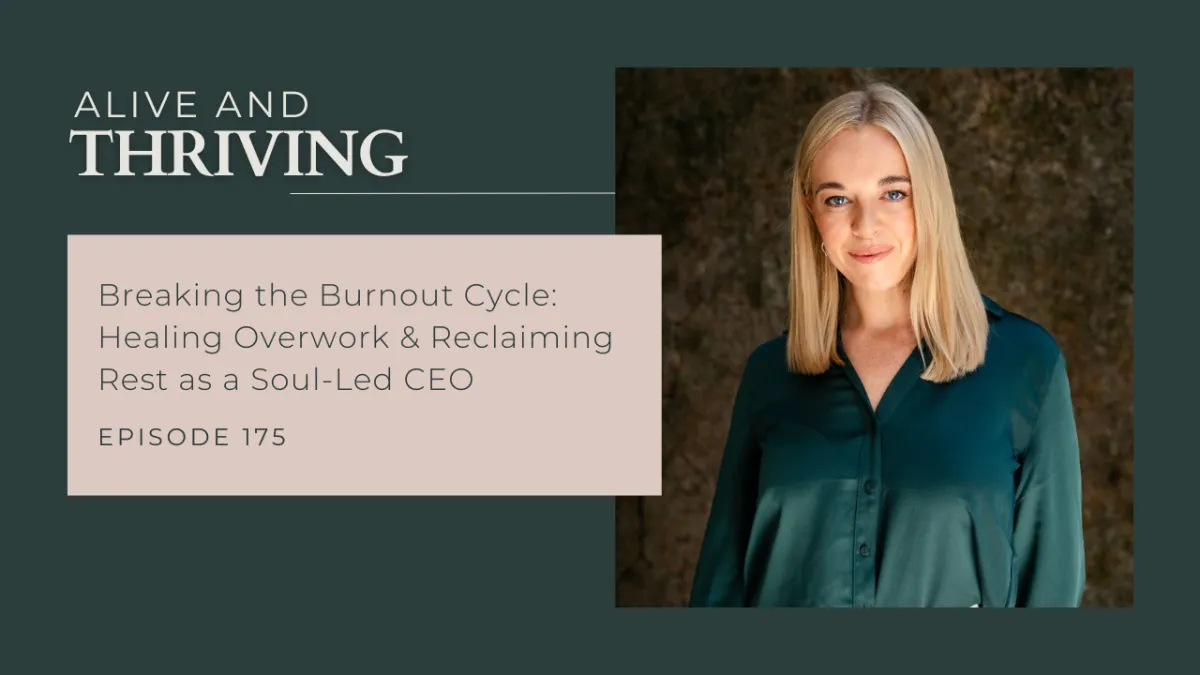
Breaking the Burnout Cycle: Healing Overwork & Reclaiming Rest as a Soul-Led CEO
LISTEN TO EPISODE HERE | WATCH EPISODE HERE
There's a moment when the mask slips. When you catch yourself rescheduling rest, again. When you have the space in your calendar, the full-body no to doing the thing, and still you say yes to someone instead of honouring your capacity. That moment when you realise you're not just tired, you're back in survival mode.
I caught myself doing it recently, and it was a stark reminder of how deeply we've inherited the emotional pattern that rest is selfish, overworking is noble, and stillness is unsafe. If you're a soul-led entrepreneur who's built something beautiful but find yourself constantly running on empty, this is for you.
This is what this episode unpacks, the generational inheritance of overwork and guilt, and why breaking this pattern isn't just about better boundaries. It's about healing what was never yours to carry in the first place.
The Emotional Inheritance We Don't Talk About
Most of us have inherited our relationship to work. We watched our mothers, our grandmothers, our caregivers rest only when everything was done, and even then, we might not have seen it happen. They were praised for pushing through illness, criticised for slowing down. Their nervous systems learned that doing equals safety and stillness equals danger.
And now, without even realising it, we've absorbed these same patterns into our businesses.
Your launches built on urgency? That's inherited programming.
Your client containers that dramatically overgive? That's survival-based generosity.
Your fear of taking up space because you haven't felt safe not working? That's your nervous system protecting you based on old information.
Before I built this business, I worked in an environment where pushing through was celebrated. Nine-to-five became seven-till-six. I showed up sick and was rewarded for it. I skipped lunch breaks, worked weekends, and was promoted for my dedication. My inner child loved all the recognition, but when I started my entrepreneurial journey, I brought every single pattern with me.
The guilt around cancelling client sessions even when bedridden. The overdelivering because I felt like I had to earn their money. The belief that success had to be earned through hard work and exhaustion. It wasn't until I started outsourcing earlier than I believed I was ready, allowing myself to cancel sessions when my energy was off, and sitting through the discomfort of doing less that I began to see it clearly.
This wasn't about work ethic. It was about worthiness.

When Your Business Becomes Your Identity
Here's what I've observed working with hundreds of soul-led entrepreneurs: somewhere along the way, your business stops being part of you and starts becoming all of you. The lines blur. The joy dims. And the hustle becomes a way to stay ahead of something deeper you don't quite want to feel.
When your business starts to feel like your identity, it's often a signal from within, a whisper that something deeper needs your attention. Busyness keeps those feelings at bay temporarily, but the truth always finds a way to surface.
For so many purpose-driven women, overworking becomes a mask for unprocessed emotion. We tell ourselves we're building something meaningful, but underneath, staying busy is easier than sitting with the quiet ache of what we haven't been willing to feel.
The signs your business has taken over your identity:
You feel guilty when you're not "productive"
Your worth fluctuates with your business wins and losses
You struggle to remember who you are outside of your work
Rest feels selfish or lazy
You panic when you think about slowing down
Your body is showing signs of chronic stress but you keep pushing
This isn't just about time management or better boundaries. When your identity fuses with your output, you stop growing from truth and start growing from pressure. Your nervous system learns that your value is tied to your performance, creating an exhausting cycle where rest feels like a threat to your very existence.
The Nervous System's Role in Overwork
Your body is holding stories that your mind doesn't even remember. When you were praised for achieving and criticised for resting, your nervous system catalogued that information as essential for survival. Now, even when your conscious mind says rest is productive, your body is whispering, "Keep going, or you'll lose love, income, respect."
This is why willpower doesn't work when it comes to breaking burnout patterns. You're not just changing a habit, you're rewiring decades of conditioning that tells your system that stillness equals danger.
The entrepreneurs I work with often describe feeling physically unsafe when they try to rest. Their hearts race when their calendars aren't packed. They feel guilty for taking breaks that their bodies desperately need. This isn't laziness or poor planning, it's a dysregulated nervous system trying to keep you safe based on outdated programming.
Common nervous system responses to rest:
Anxiety when you have "nothing" scheduled
Physical restlessness during downtime
Guilt that feels visceral when you're not working
Fear that you'll lose momentum if you slow down
Hypervigilance about what competitors are doing while you rest
Understanding this helps you approach rest not as a luxury to earn, but as a fundamental need for your nervous system to recalibrate and your business to truly thrive.

The Hidden Cost of Survival-Based Success
When you build your business from survival mode, everything becomes urgent. Your marketing feels desperate. Your client relationships become draining because you're overgiving to prove your worth. Your pricing stays low because you don't trust that you're valuable enough to charge what you're worth.
This survival-based approach might create initial success, you might hit revenue goals or gain recognition, but it's not sustainable. Eventually, your body will demand the rest you've been denying it, often through illness, burnout, or complete breakdown.
I've seen brilliant entrepreneurs hit six figures while simultaneously destroying their health, relationships, and joy. They've succeeded by conventional metrics but feel empty inside because they've built their empire on a foundation of proving rather than being.
The hidden costs include:
Chronic health issues from stress
Strained relationships with family and friends
Loss of creativity and passion for your work
Inability to enjoy your successes
Constant anxiety about maintaining your achievements
Deep exhaustion that rest doesn't seem to fix
This is why so many successful entrepreneurs still feel like they're failing. They've achieved external markers of success while abandoning the very parts of themselves that made them successful in the first place.
Breaking the Pattern: Three Reflection Cues
If you recognise yourself in this story, healing begins with honest self-reflection. These aren't comfortable questions, but they're necessary ones for breaking generational patterns of overwork:
1. Who in your lineage was only praised when they were working?
Look back at your family system. Where did you learn that rest was selfish? Who modelled the belief that worth is earned through constant doing? This pattern is generational, it's not just about you. Understanding its origins helps you see that it was never your truth to begin with.
Maybe it was a grandmother who never sat down until every dish was washed. A mother who worked multiple jobs and was praised for her sacrifice. A father who equated his value with his paycheck. These aren't judgments of their choices, they were likely doing their best with their own inherited patterns, but recognising where you learned these beliefs is the first step to choosing differently.
2. What feels emotionally at risk for you when you rest?
Get specific about your fears. Are you afraid clients won't come back if you take time off? That you'll lose momentum in your business? That you'll be seen as lazy or uncommitted? That you'll discover you're not actually as important as you thought?
I used to be terrified that if I cancelled a client session because I was unwell, they wouldn't return. This fear was reinforcing old stories I had about not being good enough. Understanding what's at stake emotionally when you rest helps you address the real issue rather than just the surface symptom.
3. What are you afraid will happen if you slow down, and what might actually happen instead?
Often our fears about slowing down are catastrophic predictions based on old programming. What if, instead of losing everything, slowing down actually allowed you to create more sustainably? What if rest improved your decision-making, creativity, and ability to serve your clients?
Start to get curious about the difference between your fear-based projections and reality. Surround yourself with entrepreneurs who are building successful businesses with white space in their calendars, nervous system-led approaches, and sustainable rhythms.
Reclaiming Rest as Revolutionary
In a culture that celebrates hustle and glorifies exhaustion, choosing rest is a radical act. It's a declaration that your worth isn't tied to your output. It's a boundary that says your well-being matters more than external validation.
But reclaiming rest isn't just about scheduling more downtime, it's about healing your relationship with productivity, worth, and safety. It's about teaching your nervous system that you can be valuable without being busy, successful without being stressed, and worthy without being exhausted.
Practical steps for reclaiming rest:
Start small with five-minute breathing breaks between tasks
Schedule rest like you would any important appointment
Notice the stories that arise when you're not being "productive"
Practice saying no to requests that don't align with your capacity
Celebrate rest as an achievement, not a failure
Remember, the version of you capable of sustainable success is the one who rests. The one who receives. The one who no longer earns love through output. Your business can't outgrow the version of you still running it, and if that version is exhausted, your business will eventually reflect that exhaustion.

The Ripple Effect of Regulated Leadership
When you begin to lead from a regulated nervous system rather than survival mode, everything shifts. Your clients feel safer in your presence because you're not energetically asking them to take care of you. Your decision-making improves because you're not operating from fear or scarcity. Your creativity returns because you've created space for inspiration to flow.
You become a model for what's possible, proof that success doesn't require sacrifice of self. Your clients, team members, and community begin to see that there's another way to build and grow that doesn't cost everything to maintain.
This is embodied entrepreneurship. This is nervous system-led business. This is what it looks like to heal not just for yourself, but for the generations that come after you.
Your Invitation to Pattern Breaking
If this conversation has stirred something in you, if you recognise the inherited patterns of overwork and are ready to choose differently, you're not alone in this healing. Breaking generational patterns takes courage, support, and tools that go deeper than surface-level strategy.
Start by giving yourself permission to rest this week. Not as a reward for working hard, but as a fundamental need. Sit through the discomfort of thinking it's lazy. Breathe with the guilt that arises. Let yourself feel what comes up without immediately filling the space with activity.
You are not broken for needing rest. You are not selfish for protecting your energy. You are not lazy for wanting a business that supports your life rather than consuming it. What you're doing is healing what was never yours to carry in the first place.
Your business is meant to be a reflection of your wholeness, not a compensation for your wounds. And that version of success, the one that feels as good as it looks, is not only possible, it's your birthright.
The woman who can hold sustainable success is already within you. She's the one who rests without guilt, leads without burning out, and creates from overflow rather than depletion. She's been waiting for you to give her permission to emerge.
This conversation is an invitation to dive deeper into healing your relationship with rest and reclaiming your rhythm as a soul-led CEO. You don't have to do this alone, and you don't have to wait until you're burned out to begin.
Ready to break the cycle of overwork and build a business that actually supports your nervous system? Explore working together through private mentoring or the 12-month mastermind for soul-led entrepreneurs where we combine emotional healing with strategic clarity for sustainable, soul-led success.
Come say hi on Instagram @jessica.read.ilc I’d love to hear what landed for you.






